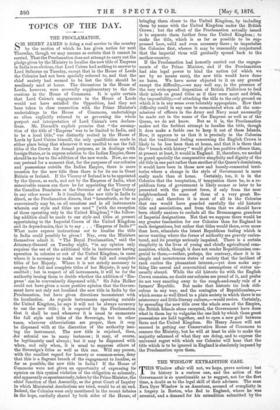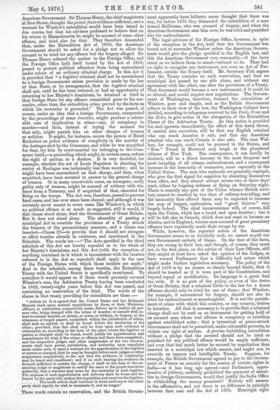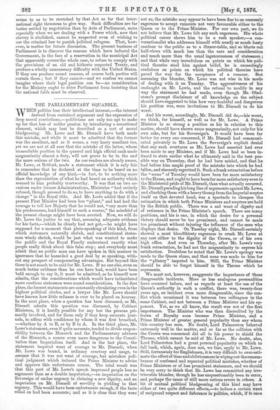THE WINSLOW EXTRADITION CASE.
THIS Winslow affair will not, we hope, prove serious ; but its history is a curious one, and the action of the Government is so questionable as to suggest, not for the first time, a doubt as to the legal skill of their advisers. The man Ezra Dyer Winslow is an American, accused of complicity in a forgery in Boston, who fled to England, where he was arrested, and a demand for his extradition submitted by the American Government. Sir Thomas Henry, the chief magistrate at Bow Street, thought the primci facie evidence sufficient, and a warrant for Winslow's extradition would have been issued in due course, but that his advisers professed to believe that on his return to Massachusetts he might be accused of some other offence, and tried also for that. They therefore demanded that, under the Extradition Act of 1870, the American Government should be asked for a pledge not to allow the accused to be tried for any offence but the forgery alleged. Sir Thomas Henry referred the matter to the Foreign Office, and the Foreign Office held itself bound by the Act of 1870, passed to protect political offenders from being surrendered under colour of an ordinary criminal charge. In this Act it is provided that " a fugitive criminal shall not be surrendered to a foreign Government unless provision is made by the law of that State, or by arrangement, that the fugitive criminal shall not, until he has been restored, or had an opportunity of returning to her Majesty's dominions, be detained or tried in that foreign State for any offence committed prior to his sur- render, other than the extradition crime proved by the facts on which his surrender is grounded." The Act was passed, of course, under an idea that a foreign Government, exasperated by the proceedings of some eineutier, might produce a colour- able case of implication in crime—say, of conspiracy to murder—and then, instead of trying the accused for that only, might punish him on other charges of treason or sedition. It might, for instance, secure the person of Henri Rochefort on police evidence of complicity in the murder of the hostages shot by the Commune, and when he was acquitted for that, try him by court-martial for belonging to the Com- mune itself,—a proceeding which might, in certain cases, reduce the right of asylum to a shadow. It is very doubtful, for example, whether the act of Louis Napoleon in shooting the sentry at Boulogne was technically less than murder; and he might have been surrendered on that charge, and then, when acquitted, have been arrested to answer to the general charge of treason. Or in many conceivable cases, an insurgent, really guilty only of treason, might be accused of robbery with vio- lence from a Treasury, and if acquitted of that, executed for firing on the troops. The Act was, therefore, passed to prevent hard cases, and has ever since been obeyed; and although it was certainly never meant to cover cases like Winslow's, in which no political offence is so much as suggested, still it would, if this clause stood alone, bind the Government of Great Britain. But it does not stand alone. The absurdity of passing a municipal Act to override the provisions of a Treaty struck the framers of the precautionary measure, and a clause was inserted—Clause 27—to provide that it should not abrogate or affect treaties already in existence, and mentioned in the Schedule. The words are :—" The Acts specified in the third schedule of this Act are hereby repealed as to the whole of her Majesty's dominions, and this Act (with the exception of anything contained in it which is inconsistent with the treaties referred to in the Act so repealed) shall apply in the case of the Foreign States with which those treaties are made." And in the schedule, among these treaties, the Extradition Treaty with the United States is specifically mentioned. To outsiders it would appear as if these words precisely covered Winslow's case, the Ashburton Treaty having been concluded in 1842, twenty-eight years before this Act was passed, and containing no reservation of the kind. The words of the clause in that treaty providing for extradition are these :— "Article 10. It is agreed that the United States and her Britannic Majesty shall, upon mutual requisitions by them, or their Ministers,
officers, or authorities, respectively made, deliver up to justice all per- sons who, being charged with the crime of murder, or assault with in- tent to commit murder, or piracy, or arson, or robbery, or forgery, or the utterance of forged papers, committed within the jurisdiction of either, shall seek an asylum or shall be found within the territories of the other ; provided, that this shall only be done upon such evidence of criminality as, according to the laws of the place where the fugitive or person so charged shall be found, would justify his apprehension and commitment for trial, if the crime or offence had there been committed ; and the respective judges and other magistrates of the two Govern- ments shall have power, jurisdiction, and authority, upon complaint made under oath, to issue a warrant for the apprehension of the fugitive or person so charged, that he may be brought before such judges or other magistrates respectively, to the end that the evidence of criminality may be heard and considered ; and if on such hearing the evidence be deemed sufficient to sustain the charge, it shall be the duty of the ex- amining judge or magistrate to certify the same to the proper executive authority, that a warrant may issue for the surrender of such fugitive.
The expense of such apprehension and delivery shall be borne and de- frayed by the party who makes the requisition and receives the fugitive.
The tenth article shall continue in force until one or the other party shall signify its wish to terminate it, and no longer."
These words contain no reservation, and the British Govern- ment apparently have hitherto never thought that there was any, for before 1870 they demanded the extradition of a man named Heilbronn, who was accused of forgery, and when the American Government sent him over, he was tried and punished also for embezzlement.
The legal advisers of the Foreign Office, however, in spite of the exception in the Act, held that the Government was bound not to surrender Winslow unless the American Govern- ment would give the pledge specified in the English law, and this the American Government very reasonably—if the facts stand as we believe them to stand—refused to do. They had no right to recognise any instrument, not even an Act of Par- liament, outside the Treaty itself. Mr. Secretary Fish argues that the Treaty contains no such reservation, and that no municipal Act passed by one side alone, and without any agreement with the other, can alter the provisions of a Treaty. That document would become a new instrument, if it could be so altered, and would require new negotiations. The Govern- ment of Washington, therefore, demand the extradition of Winslow, pure and simple, and as the British Government adhere to their view of the law, the Washington Cabinet have decided, according to telegrams received by the Daily News and the Echo, to give notice of the abrogation of the Extradition Clause of the Ashburton Treaty. As this notice is provided for, and operates immediately, the effect of this hasty threat, if carried into execution, will be that any English criminal who can reach America is safe, and that any American criminal who can reach Canada is also safe. The man Wal- lace, for example, could not be pursued in the States, and " Boss " Tweed in Montreal may laugh at the plundered citizens of New York. The consequence, it can hardly be doubted, will be a direct increase in the most frequent and most tempting of all crimes, embezzlement, and a consequent increase in the insecurity of commerce, more especially in the United States. The men who embezzle are generally employe's, who give the first signal for suspicion by absenting themselves from office, and they almost always secure two or three days' start, either by feigning sickness or flying on Saturday night. There is scarcely any part of the Union whence British terri- tory cannot be reached by two days of railway-travelling, and the immunity thus offered them may be expected to increase the crop of forgers, embezzlers, and " great thieves " very largely indeed. The chief inconvenience will, of course, fall upon the Union, which has a broad and open frontier ; but it will be felt also in Canada, which does not want to become an Alsatia, and in England, whence men accused of great pecuniary offences have repeatedly made their escape by sea.
While, however, the reported action of the American Government seems to us decidedly rash, we cannot acquit our own Government entirely of blame. On the face of the facts, they are wrong in their law, and though, of course, they must act, in the first place, on the advice of their Law Officers, still they might at least have asked the opinion of the Judges, or have warned Parliament that a difficulty had arisen which might make further legislation necessary. The policy of the Act of 1870 is by no means so clearly beyond doubt, that it should be treated as if it were part of the Constitution, and beyond repeal or modification. Its language is a great deal too wide. It is no part of the policy, or even of the desire of Great Britain, that a criminal liable to the law for a dozen offences should only be tried for one of them ; that Winslow, for example, if surrendered for forgery, should not also be tried for embezzlement or manslaughter. It is not the punish- ment of crime with which this country, or any country, desires to interfere. All that is necessary is to provide that a criminal charge shall not be used as an instrument for getting hold of
an accused man whose real offence is conspiracy or rebellion against established order ; that a tyrannical or panic-struck
Government shall not be permitted, under colourable pretexts, to violate our right of asylum. A proviso forbidding extradition without a pledge that the accused should not be tried or punished for any political offence would be amply sufficient, and even that had much better be secured by negotiation than inserted in a municipal law which cannot, and ought not, to override an express and intelligible Treaty. Suppose, for example, the British Government agreed to pay to the Govern- ment of France an annuity for the cession of certain rights in India—as it has long ago agreed—and Parliament, appre- hensive of jobbery, suddenly prohibited the payment of annui- ties to foreign Governments, would that justify the India Office in withholding the money promised ? Nobody will answer in the affirmative, and yet there is no difference in principle between that case and the Act of 1870. Municipal right
seems to us to be stretched by that Act so far that inter- national right threatens to give way. Such difficulties are far better settled by negotiation than by Acts of Parliament, more especially when we are dealing with a Power which, now that slavery is abolished, cannot be suspected even of wishing to use the criminal law to punish political refugees. That, how- ever, is matter for future discussion. The present business of Parliament is to discover the reasons which have induced the Government, in the face of a reservation in the municipal Act that apparently covers the whole case, to refuse to comply with the provisions of an old and hitherto respected Treaty, and produce a wholly unnecessary difficulty with the United States. If they can produce sound reasons, of course both parties will sustain them ; but if they cannot—and we confess we cannot imagine where their legal position can be—no consideration for the Ministry ought to deter Parliament from insisting that the national faith must be observed.




































 Previous page
Previous page